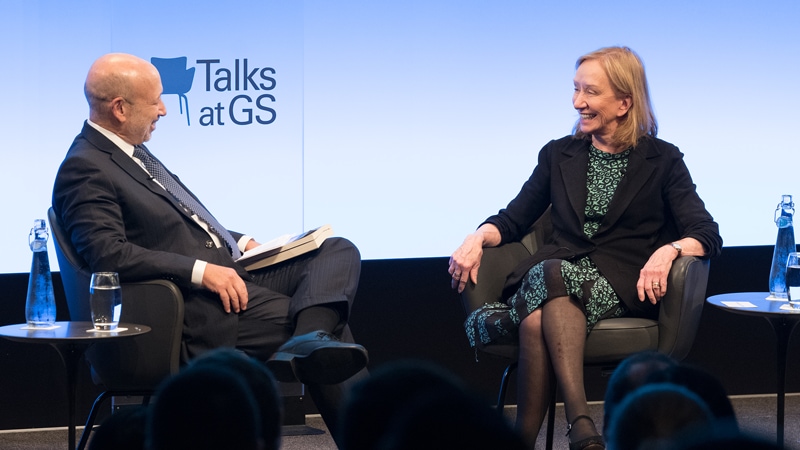Doris Kearns Goodwin, Leadership: In Turbulent Times

In this episode, presidential historian Doris Kearns Goodwin discusses how the crises endured by four US presidents – Abraham Lincoln, Theodore Roosevelt, Franklin D. Roosevelt and Lyndon B. Johnson – helped define them as leaders.
On President Lincoln: “A crisis allows you to mobilize the country. It brings the country together as citizens. And obviously Lincoln had the hardest crisis of all… He said when he first came into office – if he’d ever thought what it was going to be like in the first six months when he was there, as the country is falling apart, a civil war that’s going to kill 600,000 people is already starting. He couldn’t have thought he could have lived through it. And yet he not only lived through it, but he was able to make forever his name through the Emancipation Proclamation.”
On President Theodore Roosevelt: “Fate had so intervened in his life with the death of [his mother and wife] that…when he came back from the Badlands, [he said,] ‘I’m just going to take whatever job I think is worthy and imagine it’s my last job, because it might be’…he becomes Civil Service Commissioner…he’s offered Police Commissioner of New York…then he becomes Assistant Secretary of the Navy. And as soon as the Spanish-American War starts he volunteers to be a soldier. And they say you are much more important as Assistant Secretary of the Navy than you are as a soldier. ‘Nope, I want to be a soldier.’ And then eventually he becomes governor, vice president and president. And the youngest president in the history of the country. But he had this winding path to leadership rather than the straight-up path. So that might be a lesson for people sometimes. You go horizontally or even down but you’re learning some new experience.”
On President Franklin D. Roosevelt: “There’s a moment in the 1936 election when he’s going to give his acceptance speech and he’s being helped down the aisle. And he shakes somebody’s hand, and he falls down, his braces unlock, his speech falls out all over the floor. He says, ‘Get me up.’ They get him up. He puts his speeches in place, he goes back on the podium. He delivers the ‘Rendezvous with Destiny’ speech, one of the great acceptance speeches. They never mention that he’s fallen. There’s never a picture of him on the wrong.”
On President Johnson: “[There] was such a sadness that surrounded him at the ranch in those [final] years. He knew that his domestic legacy had been cut in two. What he did domestically now is being more fully understood after 50 years. Not only Medicare and three civil rights bills, but NPR and PBS and immigration reform and Head Start. I mean it’s extraordinary – any one of those bills would have made a president’s legacy. And he had it all, but then the war in Vietnam cut that legacy in two. And even as we were on the ranch, and we would be talking about his future or how he might be remembered, all he would ever say was, ‘I just hope I can be remembered for civil rights.’”
Our signature newsletter with insights and analysis from across the firm
By submitting this information, you agree that the information you are providing is subject to Goldman Sachs’ privacy policy and Terms of Use. You consent to receive our newletter via email.